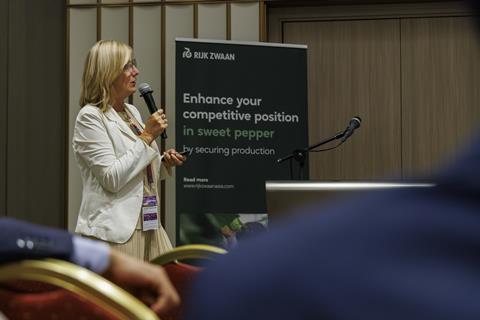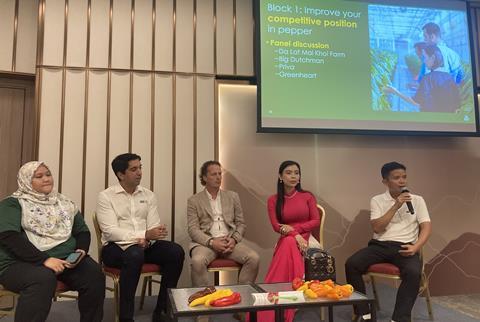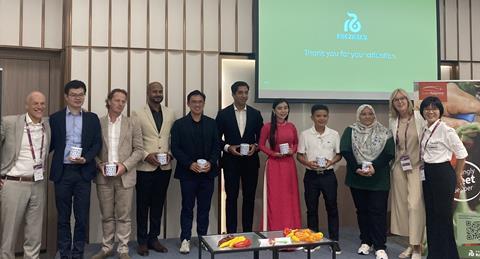Vegetable seed company Rijk Zwaan hosted a sweet pepper seminar in Hong Kong at the start of September to discuss the “enormous” market potential in the region
On 3 September, the day before Asia Fruit Logistica in Hong Kong, vegetable seed breeder Rijk Zwaan organised a seminar focused on sweet peppers, as market potential continues to develop in the Asia region.
“It is an exciting category,” said Jan Doldersum, “and there is further room for growth in Asia for sweet peppers.”
“The potential for the pepper market in Asia is enormous, yet there is significant progress to be made in developing high-quality peppers in Asia and extending the category by introducing new SKUs,” the company stated.

Pepper potential across Asia
The Sweet Palermo pointed pepper is seen as a key product, thanks to its sweet taste, with a high Brix of up to 10, and high vitamin C content, higher than an orange or a kiwifruit. In addition to being healthy, it is also versatile, consumed raw in a salad or cooked on the BBQ.
Raising awareness of such characteristics is an essential part of the strategy in Asia, with tastings often required to convince consumers the pepper is not hot.
“The potential in India is huge,” said Ranjeep Karpe of Nutrifresh. “We do Sn!bs and Sweet Palermo. The Palermo was slow going. Peppers are attached to spiciness in India, so tastings are important. As of today, there is momentum.”
The snack-sized Sn!bs, supported by a Facebook campaign and communications through the Love My Salad project, was immediately accepted by consumers in India, according to Karpe.
Research in the Malaysian market demonstrated the importance of selling the peppers in mixed-colour bags of red, green, yellow and orange, since the red variety was most likely to be seen as hot.
For the company’s tropical Tatayoyo pepper, which won the Fruit Logistica Innovation Award in 2023, Rijk Zwaan’s focus is initially on China and Taiwan following successful trials in Europe.
“Our study showed that 88 per cent of European consumers loved it, compared with 50-60 per cent for other peppers,” said the company’s Heleen van Rijn-Wassenaar. “Its size is somewhere between a snack and a blocky pepper, but it is the taste difference, the high Brix and fruity volatiles often found in tropical fruit and fine wines, that makes it stand out.”
In Canada, Rijk Zwaan elected to co-brand the product following a request by retailer Loblaws to use Tatayoyo for its well known President’s Choice premium label.
“The reason we create brands is to support the introduction of new products with unique traits,” said van Rijn-Wassenaar. “We aim to work together to tell the same message. It’s important to select the right partner, understand the target group and secure product quality.”
She also said it was important to remember that the market had changed significantly since the Covid-19 pandemic. “There has been an increase in online sales and a rise in health awareness,” she said. “Meanwhile, the economic situation has been very challenging.”
“Consumers are paying more attention to their health,” said Daren Zhou of Dole China, which was highly successful in its introduction of Sweet Palermo in China. “The health concept and the high vitamin C in Sweet Palermo peppers is an important starting point when promoting to consumers.”
Embracing sustainable solutions
Rijk Zwaan’s Hong Tran Thi Thanh said that consumers were also paying greater attention to things like pesticide residues on vegetables. “More and more pests and diseases are becoming resistant to pesticides,” she said, “so alternative solutions are needed.”
Nguyen Tu and Nguyen Ngan, owners of Vietnam’s Da Lat Mai Khoi Farm, discussed the improvements they had seen from using sustainable solutions such as beneficial insects. “We have created a better environment for all, and there has been a big improvement in product quality,” said Ngan. “There is still room to improve in the future. It’s important to go step by step and not to invest in too many crops at once, and of course, to always use high-quality seeds.”

“Seed selection is so important,” added Khoo Peng Keat of Food Forest Farm in Malaysia, which grows without the use of pesticides and supplies supermarkets in Malaysia and Singapore.
“It took a long time, but we managed to introduce Sn!bs in Malaysia,” he said. “It’s a versatile product. There is a healthy snacking trend on the market, and interest in cooking at home is growing.”
Nur Affah of Malaysian producer Greenheart stressed the importance of climate control for the production of consistent volumes of high-quality peppers.
“The weather fluctuates from cold in the morning to hot in the afternoon, followed by a lot of rainfall, so controlling the climate inside is important,” she said. “We have plans to expand our farm to keep up with demand. If you want to produce peppers, our advice is to start small-scale and learn how to manage the farm using IPM techniques and train your team to use these effectively.”
Robert van der Kamp, from greenhouse builder Big Dutchman, pointed out the huge potential in Vietnam and the wider region given the rising demand for safe food.
“Most growers in Asia are low-tech,” he said, “but ready to take the next step, moving into clean production with closed facilities. The main issue is that growers in Vietnam are used to a return on investment in two years rather than three to four. We need to bring in the retailers to invest in local facilities.”
Priva’s Manuel Madani stressed the need to give countries in the region time, reminding the audience of the gradual progress seen in Europe. “In the Netherlands, the government has been pushing companies to innovate ever since the 1970s,” he said. “It took time. So it’s not fair to rush other countries to invest all at once in high-tech greenhouses. Starting with small adjustments can already make a difference.”




